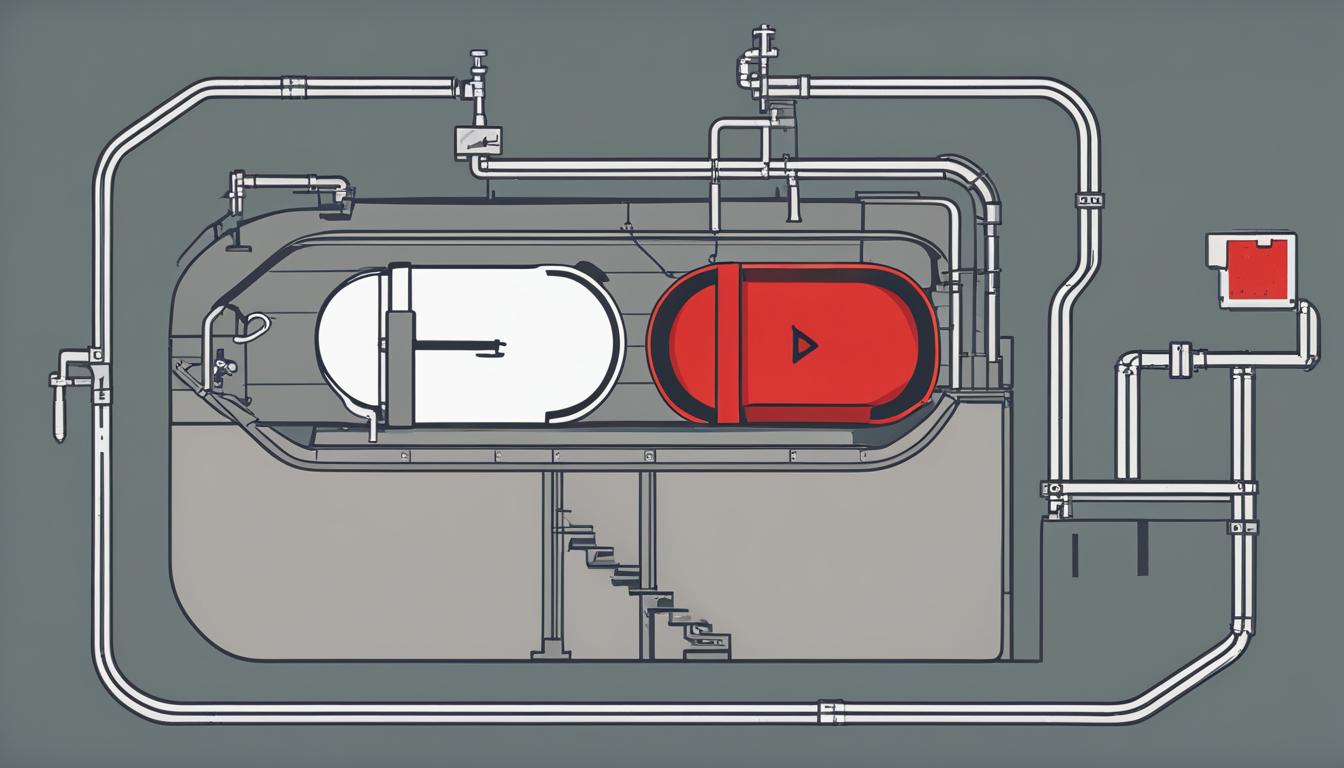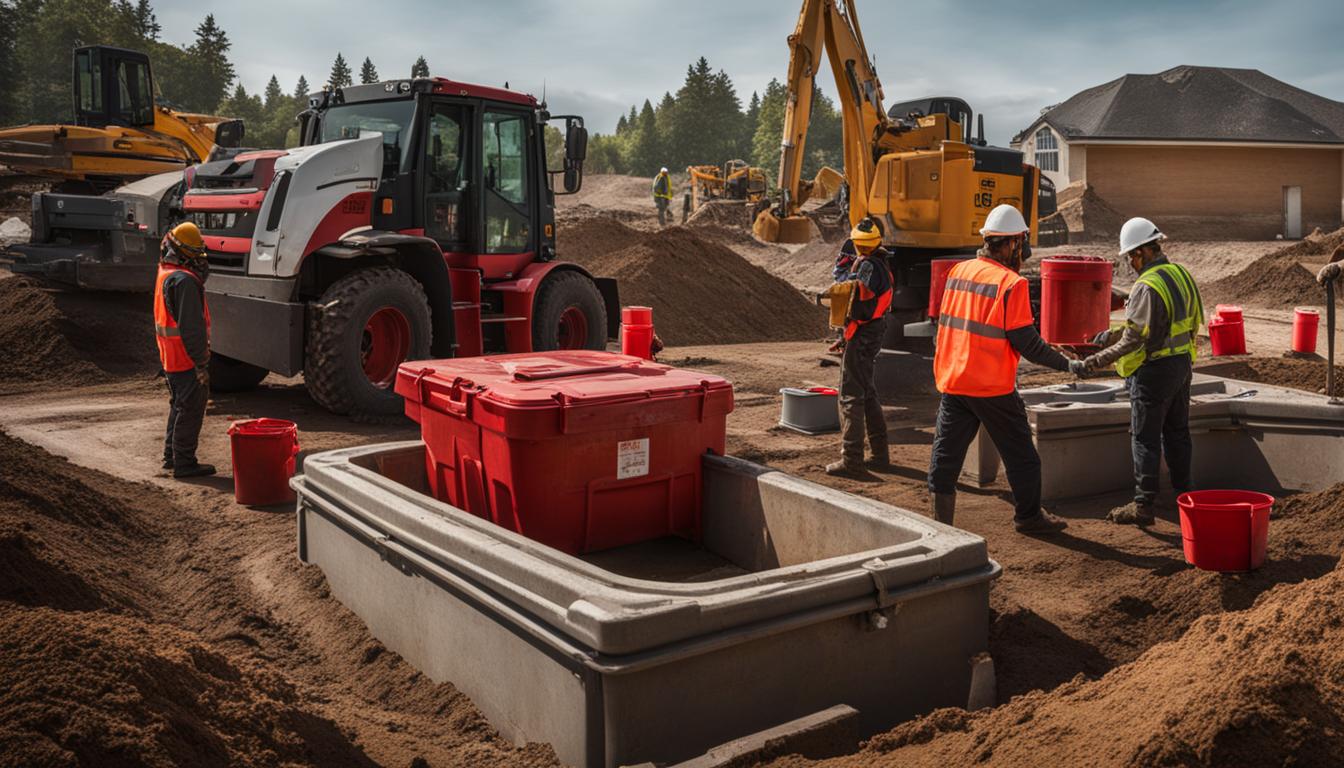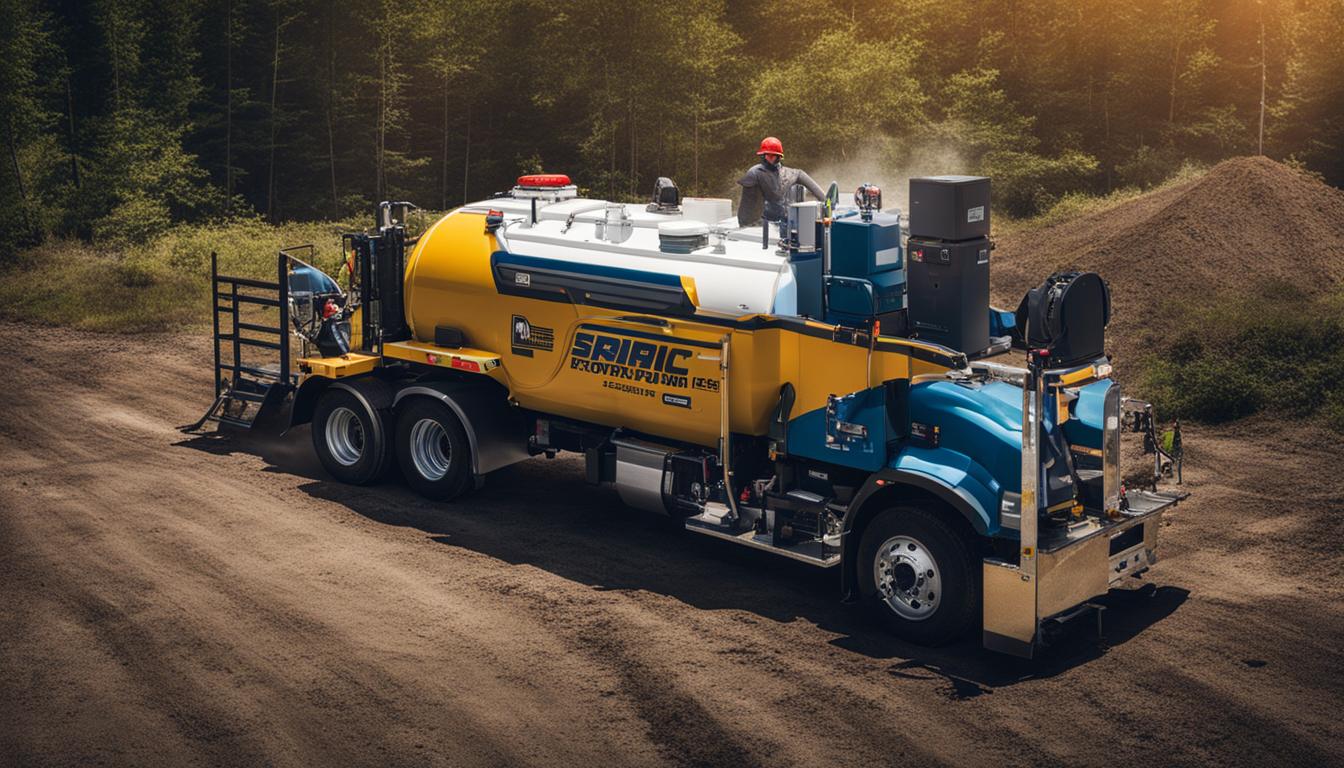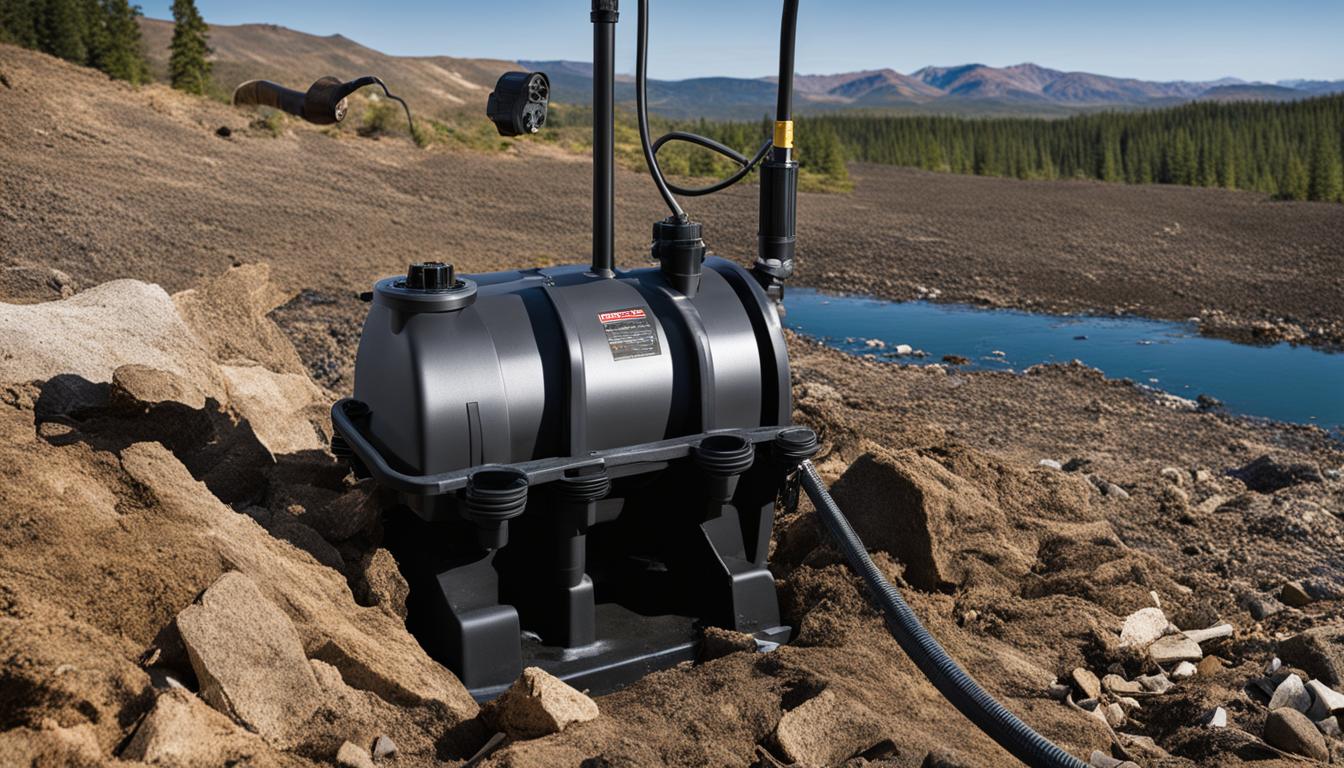In this guide, we will explore the most effective strategies to combat the health hazards that arise from overflowing septic tank emergencies. Septic tank overflow can pose significant risks to your health and well-being, and it’s crucial to be aware of the dangers and take steps to prevent them. By following these seven methods, you can minimize the risks associated with tank overflow and protect yourself from the hazards of septic tank emergencies.
Key Takeaways
- Septic tank overflow can cause significant health hazards.
- Regular maintenance and inspection can prevent tank overflow.
- Proper waste disposal and water conservation can reduce the risk of tank overflow.
- Early detection and prompt repair of system issues are crucial to preventing tank overflow hazards.
- Caring for your drain field can minimize septic tank emergencies.
Understanding the Health Hazards of Septic Tank Overflow
At some point, almost every homeowner will experience septic system issues, and overflow emergencies can pose significant health hazards if not addressed promptly and efficiently. In this section, we will explore the potential dangers and health risks that can arise from septic tank overflow issues.
Health Hazards From Overflowing Septic Tank Emergencies: Septic tank overflow can result in exposure to harmful bacteria, viruses, and other pathogens that can cause illnesses such as gastroenteritis, hepatitis, and more. In addition, exposure to sewage gases can cause respiratory issues and irritation of the eyes, nose, and throat.
Risks associated with tank overflow: Septic system failures can cause backups and overflows, leading to property damage and contamination of nearby water bodies. Moreover, septic backups and overflows can be costly to alleviate and may pose legal liabilities in some cases.
Health hazards from urgent tank issues: Failure to address urgent septic tank issues, such as overflow emergencies, can pose significant health hazards to household members. Exposure to infectious agents and harmful substances in sewage can cause severe illnesses or allergies, in some cases.
“Septic tank overflow can result in exposure to harmful bacteria, viruses, and other pathogens that can cause illnesses such as gastroenteritis, hepatitis, and more. In addition, exposure to sewage gases can cause respiratory issues and irritation of the eyes, nose, and throat.”
It’s critical to recognize the warning signs of septic system issues, including foul odors, slow drains, gurgling noises, and backups, to avoid septic tank overflow emergencies. Implementing preventative measures and being aware of the risks will minimize the chances of encountering septic system emergencies, protecting your health and well-being.
Regular Septic Tank Maintenance and Inspection
Regular septic tank maintenance is one of the most effective ways to prevent tank overflow and minimize health hazards. We recommend adhering to a regular maintenance schedule that includes pumping, cleaning, and inspections.
The Importance of Routine Maintenance
Septic systems need regular maintenance to continue functioning efficiently and prevent issues that could lead to overflowing. Regular pumping and cleaning of the tank are essential to remove accumulated solids that can cause clogs and eventually lead to system failure.
Inspections are also crucial to identify any potential issues before they escalate into larger problems. Inspecting the tank and other components of the system, such as the drain field, can help detect warning signs of system failure, including slow-draining sinks and toilets, foul odors, and wet spots in the yard.
Preventing Tank Overflow
Regular maintenance can significantly reduce the risk of tank overflow, as accumulated solids, along with factors like excessive water usage, can overwhelm the septic system and cause it to fail. Pumping the tank every three to five years, based on household size and usage, is recommended to prevent clogs and backups that lead to tank overflow.
In addition to regular pumping and cleaning, it’s crucial to avoid flushing non-biodegradable items, such as wipes and feminine hygiene products, down the drain. These items can clog the system and contribute to tank overflow. Limiting the use of chemicals that can disrupt the septic system’s natural bacteria balance is also essential in preventing tank overflow and maintaining a healthy septic system.
Health Hazards from Urgent Tank Issues
Failure to maintain the septic system can result in system failure and tank overflow, leading to health hazards such as exposure to harmful bacteria and pathogens. Bacterial infections, skin irritation, and respiratory issues are among the health risks associated with overflowing septic tanks.
Regular maintenance and inspection can prevent these issues and protect the health and well-being of your family.
Proper Disposal of Waste and Chemicals
Proper waste disposal is crucial in preventing septic tank overflow and avoiding the health hazards associated with urgent tank issues.
One of the most important things you can do is to avoid flushing non-biodegradable items and limiting the use of chemicals that can disrupt the septic system. These include:
- Disposable wipes and diapers
- Cigarette butts
- Grease and oils
- Paints and solvents
- Medications
Flushing or disposing of these items improperly can cause blockages in the pipes and tanks, leading to overflow and contamination.
It’s also essential to use septic-safe cleaning products and limit the use of chemicals that can kill the bacteria in the septic system. These include chlorine bleach, drain cleaners, and antibacterial soaps. Instead, opt for natural or biodegradable alternatives.
Lastly, it’s crucial to have your septic tank pumped and cleaned regularly to prevent build-up and overflow. The frequency of pumping depends on the size of your tank and the number of people in your household. A professional septic service provider can help determine an appropriate schedule for your system.
Monitoring Water Usage and Conservation
Monitoring water usage is a critical component of preventing septic tank overflow and mitigating related health hazards. By being mindful of water consumption, you can reduce the strain on your septic system and avoid urgent tank issues.
One effective approach to monitoring water usage is to keep a log of water consumption. This log can include information such as water usage during specific activities, like laundry or showers, and also record any leaks or water-related issues. By tracking your water usage, you can detect changes in water consumption and address any issues before they escalate.
Water Conservation Strategies
Implementing water conservation strategies is another way to control and monitor water usage. Here are some effective strategies to consider:
- Replace older toilets and appliances with water-efficient models.
- Fix any leaks or dripping faucets promptly.
- Avoid running water while brushing your teeth or shaving.
- Take shorter showers and limit baths.
- Collect and reuse greywater for irrigation purposes.
By adopting these water conservation measures, you can reduce your overall water usage and prevent septic tank overflow.
Early Detection and Prompt Repair of System Issues
Timely detection and repair of septic system issues are crucial to prevent tank overflow hazards. By being vigilant and taking proactive measures, you can avoid septic tank emergencies and the associated health risks.
One of the most important steps in early detection is regular system inspections. It is recommended to have your septic system inspected at least once every three years by a licensed professional. During the inspection, the technician can identify any potential issues and recommend solutions before they become severe.
It is essential to be aware of warning signs that may indicate septic system problems. These may include slow draining or gurgling pipes, foul odors, and excessive vegetation growth around the drain field. If you notice any of these signs, it is vital to address the issue promptly before it leads to more severe problems.
Preventing Tank Overflow
By detecting and addressing system issues early, you can prevent tank overflow and the associated health hazards. In addition to regular inspections and being aware of warning signs, proper maintenance can also help prevent emergencies. Regular pumping and cleaning can reduce the risk of tank overflow by preventing buildup and ensuring proper system functioning.
Health Hazards from Urgent Tank Issues
Ignoring septic system problems can lead to severe health hazards. In addition to the unpleasant odors and inconvenience, tank overflow can expose you and your family to harmful pathogens, bacteria, and other toxins. These hazards can also contaminate nearby water sources, posing a risk to public health.
Don’t wait until it’s too late to address septic system issues. By being vigilant, proactive, and seeking professional assistance when needed, you can protect your health and ensure a safe and well-maintained septic system.
Proper Drain Field Maintenance
Proper maintenance of the drain field is crucial to prevent septic tank overflow and minimize health hazards associated with it. Neglected drain fields can lead to clogging, flooding, and soil contamination, which can pose significant risks to human health and the environment.
Here are some essential tips for maintaining a healthy drain field:
- Limit water usage: Excessive water usage can overload the drain field and increase the risk of overflow. To prevent this, avoid taking long showers, fix any leaks promptly, and use water-efficient appliances.
- Avoid planting trees and shrubs near the drain field: The roots of trees and shrubs can infiltrate the drain field and cause clogging, blockages, and other damage. To avoid this, keep a safe distance between trees, shrubs, and the drain field.
- Do not park or drive over the drain field: The weight of vehicles can compress the soil, reduce the drain field’s effectiveness, and contribute to overflow hazards. To prevent this, keep vehicles away from the drain field and avoid compacting the soil.
- Regular inspections: Regular inspections of the drain field can help detect early signs of damage, prevent clogs, and ensure proper functioning. Hire a professional septic service to conduct routine inspections and maintenance of the drain field.
- Pump the tank: Regular septic tank pumping can prevent the accumulation of solid waste and maintain the drain field’s functionality. A professional septic service can determine the appropriate pumping schedule based on the tank size and usage.
Following these practices will help ensure proper drain field maintenance, reduce the risks associated with septic tank overflow, and keep you and your environment safe.
Education and Awareness for Household Members
At our septic services company, we believe that education and awareness are critical in preventing septic tank overflow hazards. Each household member should be aware of septic system basics, including the impact of improper waste disposal and excessive water usage on the septic system and the potential health hazards from urgent tank issues. Educating your family on proper septic system usage can go a long way in preventing septic tank emergencies and minimizing health risks.
One of the essential aspects of septic system education is properly disposing of waste. All household members should be aware of what is safe and unsafe to flush or pour down drains, including non-biodegradable items, such as cleaning wipes, and harmful chemicals, like pesticides and drain cleaners. To ensure proper waste disposal, consider labeling trash cans and the toilet with appropriate disposal items, and remind family members regularly.
Monitoring water usage is also essential to prevent septic tank overflow. Explain to your family that excessive water usage can strain the septic system, leading to potential emergencies. Encourage shorter showers, fixing water leaks, and spreading laundry over several days to reduce water usage. These minor adjustments can make a significant difference in maintaining a healthy septic system.
Finally, we recommend scheduling routine system inspections and pumping by a professional service provider. Educate your family about warning signs that indicate possible system issues, such as slow drains, gurgling sounds, and persistent odors. By being aware of these warning signs, you can address the issues early, before they become more severe.
Hiring Professional Septic Services
While regular maintenance is crucial, it is essential to hire professional septic tank technicians to provide an added layer of protection against tank overflow hazards. Septic system emergencies can occur unexpectedly, and inexperienced homeowners may lack the necessary knowledge and tools to address urgent issues. In this section, we will discuss the benefits of hiring professionals for septic system maintenance, inspections, and repairs.
Risks associated with tank overflow and dangers of septic tank emergencies
Septic tank overflow can pose significant health hazards and lead to costly repairs if not immediately addressed. The risks associated with tank overflow include contamination of groundwater and nearby waterways, property damage, and exposure to harmful bacteria and gases. In addition, septic tank emergencies can cause foul odors, clogged drains, and wastewater backups, which can significantly disrupt daily life.
Health hazards from urgent tank issues
Urgent septic tank issues can cause a variety of health hazards. Exposure to harmful bacteria, viruses, and gases can lead to respiratory infections, skin irritations, and gastrointestinal problems. In addition, contaminated water sources can cause serious illnesses, including hepatitis and E. coli infections.
Hiring professional septic services can mitigate these risks and ensure that your septic system is operating correctly. Professionals have the knowledge, experience, and tools necessary to inspect, diagnose, and repair septic system issues promptly. They can also provide guidance on proper septic system maintenance and usage, including waste disposal and water conservation habits.
The benefits of hiring professional septic services
Enlisting the services of professional septic tank technicians offers several benefits, including:
- Thorough inspections and diagnostics to identify potential issues before they become emergencies
- Prompt and effective repairs to prevent septic tank overflow
- Proper disposal of wastewater and solid waste to prevent environmental contamination
- Guidance on proper septic system maintenance and usage to maximize effectiveness and longevity
- State-of-the-art tools and technology to address complex septic system issues
By relying on professional septic services, homeowners can ensure that their septic systems are operating correctly and that any issues are addressed promptly and effectively. This can minimize the risks associated with tank overflow and protect the health and well-being of households.
Emergency Preparedness for Tank Overflow
Even with the best preventative measures, septic tank overflow emergencies can still occur. To minimize health hazards and effectively respond to an overflow event, it’s essential to have an emergency plan in place. Here are some tips to help you prepare:
- Know the warning signs: Be mindful of any signs of an overflowing septic tank, such as slow drainage, sewage backups, and foul odors.
- Identify the shut-off valve: Locate the valve that controls the flow of sewage to the tank and mark it clearly. In case of an emergency, turn off the valve to prevent further overflow.
- Have emergency tools on hand: Keep a set of tools, including a shovel, gloves, and a bucket, easily accessible for emergency situations.
- Designate a safe area: Identify a safe area away from the septic tank and designate it as a meeting point for everyone in the household in case of an overflow emergency.
- Contact professional septic services: In the event of a septic tank emergency, contact professional septic services immediately for prompt repair and cleanup.
By taking these steps and having an emergency plan in place, you can ensure that you and your household members are prepared to respond effectively in case of a septic tank overflow emergency, minimizing health hazards and property damage.
Conclusion
In conclusion, the health hazards from overflowing septic tank emergencies cannot be understated. It is crucial to understand the risks associated with tank overflow and the dangers of septic tank emergencies. By adopting the seven best ways to combat septic tank overflow hazards outlined in this guide, we can minimize the risks associated with tank overflow and protect ourselves from the health hazards from urgent tank issues.
Regular maintenance and inspections, proper waste disposal and water conservation, early detection, and prompt repair of system issues, proper drain field maintenance, education and awareness for household members, hiring professional septic services, and emergency preparedness are all essential strategies that can prevent tank overflow and the associated health hazards.
It is vital to be informed, proactive, and to seek professional assistance when needed to ensure a safe and well-maintained septic system. By implementing the best practices outlined in this guide, we can mitigate the risks of septic tank emergencies and protect our health and well-being. Stay safe and maintain a healthy septic system.
FAQ
What are the health hazards associated with septic tank overflow emergencies?
Septic tank overflow emergencies can lead to various health hazards such as exposure to harmful pathogens, contaminants in the groundwater, unpleasant odors, and potential property damage.
How can I combat septic tank overflow hazards?
You can combat septic tank overflow hazards by following these seven methods: regular septic tank maintenance and inspection, proper disposal of waste and chemicals, monitoring water usage and conservation, early detection and prompt repair of system issues, proper drain field maintenance, education and awareness for household members, and hiring professional septic services.
How often should I schedule septic tank maintenance and inspection?
It is recommended to schedule septic tank maintenance and inspection at least once every three to five years. However, this frequency may vary based on your household size, water usage, and local regulations. Consulting a professional can help determine the appropriate schedule for your specific situation.
What items should I avoid flushing into my septic system?
Non-biodegradable items such as diapers, feminine hygiene products, paper towels, cigarette butts, and grease should never be flushed into your septic system. These items can clog the system and contribute to overflow emergencies.
How can excessive water usage contribute to septic tank overflow?
Excessive water usage can overwhelm your septic system by filling it up faster than it can handle. This puts pressure on the system and increases the risk of overflow emergencies. Monitoring water usage and implementing water conservation measures can help prevent these issues.
What are some warning signs of septic system issues that I should look out for?
Warning signs of septic system issues include slow drains, gurgling sounds in pipes, foul odors in and around the house, sewage backups, and unusually lush or wet patches in your yard. If you notice any of these signs, it’s important to address the problem promptly to prevent tank overflow and related health hazards.
How can I maintain my drain field properly?
Proper drain field maintenance involves preventing root intrusion by planting trees and shrubs away from the drain field, avoiding parking vehicles or heavy machinery over the drain field, and managing excess water by diverting roof drains and surface water away from the area.
What should I educate my household members about regarding septic system usage?
It is important to educate your household members about proper waste disposal practices, such as avoiding flushing non-biodegradable items and limiting the use of chemicals that can disrupt the septic system. Additionally, they should be aware of the importance of conserving water to prevent septic tank overflow emergencies.
Why should I hire professional septic services?
Hiring professional septic services ensures that your septic system receives expert maintenance, inspections, and repairs. Professionals have the knowledge, experience, and equipment necessary to identify and address potential issues before they escalate into emergencies, reducing the risks associated with septic tank overflow.
How can I prepare for a septic tank overflow emergency?
To prepare for a septic tank overflow emergency, create an emergency plan that includes steps to take during an overflow event. This may involve shutting off water supply, avoiding the affected areas, and contacting professional septic services for immediate assistance. Being prepared can help minimize health hazards and property damage.




